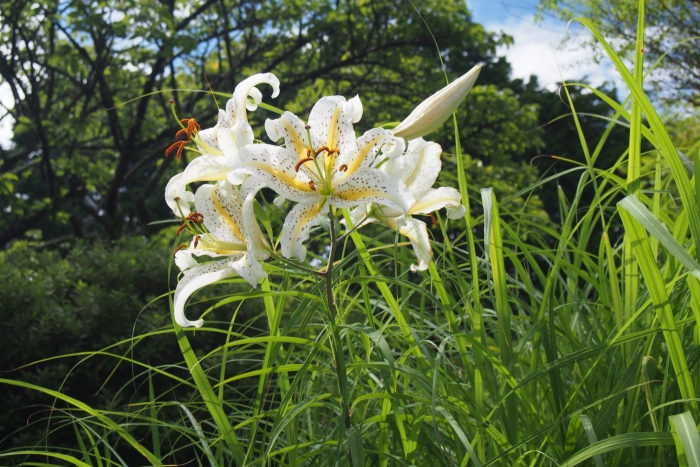Golden-Rayed Lily
(Lilium auratum)
Golden-Rayed Lily (Lilium auratum)
/
/

harum.koh
CC BY-SA 4.0
Image By:
harum.koh
Recorded By:
Copyright:
CC BY-SA 4.0
Copyright Notice:
Photo by: harum.koh | License Type: CC BY-SA 4.0 | License URL: http://creativecommons.org/licenses/by-sa/4.0/ | Rights Holder: harum.koh | Publisher: iNaturalist | Date Created: 2016-08-01T13:56:49-07:00 |


























Estimated Native Range
Summary
Lilium auratum, commonly known as Golden-Rayed Lily, is a perennial bulb that is deciduous or semi-deciduous depending on the climate, native to the cool, mountainous regions of Japan. It is a true lily, valued for its exceptionally large and fragrant flowers, which bloom in the summer. The typical flower color is white with bold gold radial markings and orange spots, although the variety ’platyphyllum’ has a gold stripe along the tepals but lacks spots. The flowers are among the largest of any lily species, and mature plants can reach up to 2.5 meters (8 feet) in height and carry up to twenty blossoms each. These blossoms are highly showy and aromatic, attracting pollinators and admirers alike.
The Golden-Rayed Lily is celebrated for its striking flowers and is often used in ornamental plantings, borders, and as a specimen plant in gardens. It requires well-drained soil that is plain or slightly acidic; rich or fertilized soil can be detrimental. Planting bulbs at a depth and width three times their size is crucial for proper development. A partially shaded base with a sunlit top is ideal for this lily. While it can be grown from seed, scaling is a more efficient method for propagation. The shorter lifespan of this species, typically 3 to 4 years, necessitates regular cultivation efforts to maintain its presence in the garden. In terms of care, it thrives in full sun to part shade and needs moderate watering, with a preference for soils with slow to medium drainage.CC BY-SA 4.0
The Golden-Rayed Lily is celebrated for its striking flowers and is often used in ornamental plantings, borders, and as a specimen plant in gardens. It requires well-drained soil that is plain or slightly acidic; rich or fertilized soil can be detrimental. Planting bulbs at a depth and width three times their size is crucial for proper development. A partially shaded base with a sunlit top is ideal for this lily. While it can be grown from seed, scaling is a more efficient method for propagation. The shorter lifespan of this species, typically 3 to 4 years, necessitates regular cultivation efforts to maintain its presence in the garden. In terms of care, it thrives in full sun to part shade and needs moderate watering, with a preference for soils with slow to medium drainage.CC BY-SA 4.0
Plant Description
- Plant Type: Bulb
- Height: 2-5 feet
- Width: 1-2 feet
- Growth Rate: Moderate
- Flower Color: White, Yellow
- Flowering Season: Summer
- Leaf Retention: Deciduous
Growth Requirements
- Sun: Full Sun, Part Shade
- Water: Medium
- Drainage: Slow, Medium
Common Uses
Bee Garden, Bird Garden, Butterfly Garden, Edible*Disclaimer: Easyscape's listed plant edibility is for informational use. Always verify the safety and proper identification of any plant before consumption., Fragrant, Hummingbird Garden, Showy Flowers
Natural Habitat
Cool, mountainous regions of Japan
Other Names
Common Names: Golden-Ray Lily, Goldband Lily, Golden-Ray Lily Of Japan, Mountain Lily, Gold-Band Lily, Gullbandslilja, Lírio, Yama-Yuri
Scientific Names: , Lilium auratum,
GBIF Accepted Name: Lilium auratum Lindl.